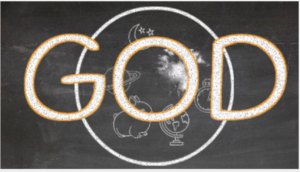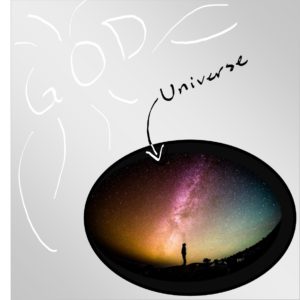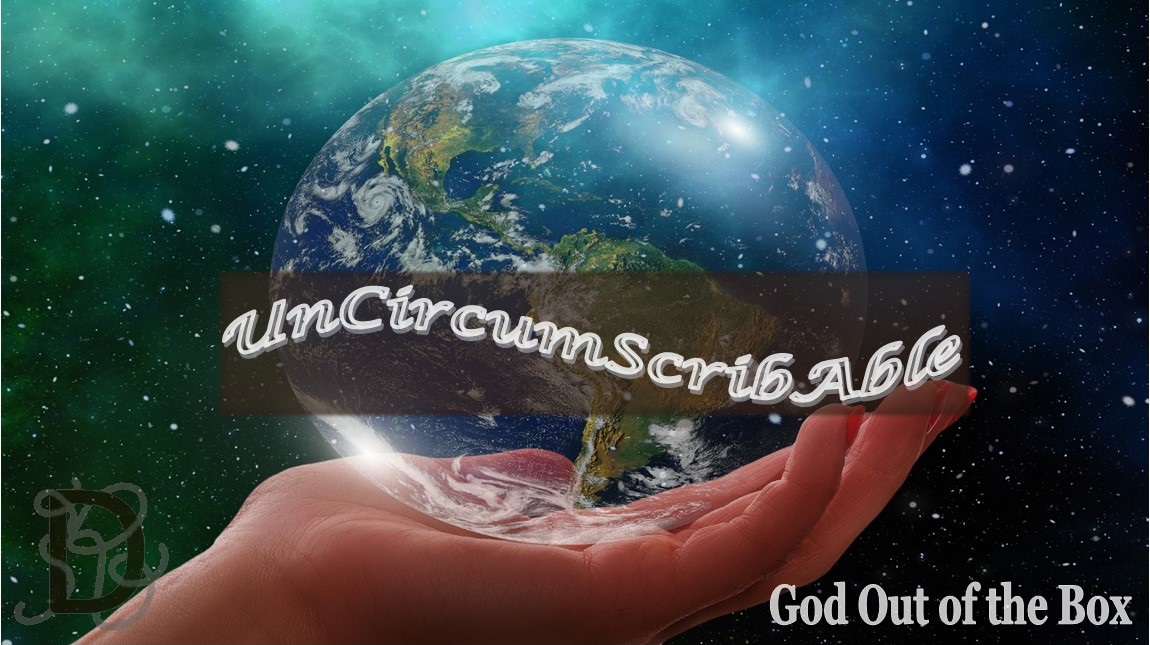“Uncircumscribable” is not a term we usually in our churches today – but it should be.
For one thing, it’s a really simple term (hang on, I’ll explain!). More simple, even, than certain familiar terms like “eternal,” or “everlasting,” “immortal,” “deathless,” “ageless,” “uncreated…”
Think about it – do you really know the meaning of any of those words we often use to describe God?
And really, all of those words are just trying to say what “uncircumscribable” says in a much more simple, straightforward way.
Uncircumscribable is, without question, my favorite way to describe who and what God is. The other words are great, too, but none really capture what’s happening with the same eloquent simplicity. Because, when you break this crazy-long, important-sounding, Latinate word down, it is really, really easy to grasp.
Why it matters
 Scholars can (and have) debate for decades about the exact meaning of words like “eternal” and “uncreated.” They can (and have) debate for decades what it means for God to be “eternal” or “deathless,” and how, exactly, God’s eternity interacts with this ever-decaying universe we live in.
Scholars can (and have) debate for decades about the exact meaning of words like “eternal” and “uncreated.” They can (and have) debate for decades what it means for God to be “eternal” or “deathless,” and how, exactly, God’s eternity interacts with this ever-decaying universe we live in.
Is God a part of the universe? Do the laws of time and entropy just not apply to God? Did God create the universe out of nothing, or did energy exist in the beginning along with God, or is God energy?
Depending on how you define words like “eternal” and “ageless,” all of these questions can be answered in very different ways, while still using all those same words, like “everlasting.” to describe God.
In other words, we can be using the exact same words to describe God, but still be disagreeing radically about what God really is like. This creates a great deal of confusion, and wastes a lot of time.
“Uncircumscribable” cuts through all this noise and gets to the point – quickly.
Breaking it down
In order to get there, though, we do have to take a moment and pull the word apart. It consists of four Latinate roots (words that come from the Latin language), and can be broken down like this:
Un + circum + scribe + able
Circum means “circle.” Able means “capable of,” “can” or – well – “able.” Scribe means “write” or “draw” (you know, like a scribe would). And Un means “can’t.”
Put it all together, and you get a word that means, quite simply: “You cannot draw a circle around it.”
If you like visual aids, check out this video for an introduction to the use and benefits of this term. And for more details, keep reading!
Eternity
What I love most about this as a term for God is that it gives an immediate, vivid, and relatable image to something that is very difficult for us humans to understand.
We are not eternal, and it is therefore difficult for us to even comprehend eternity. Just look at the stories that feature immortal characters. In all of those stories, the characters struggle to adjust to their immortality. In many of them, they actually try to regain their mortality, because the immortal life is just too vast, too empty, too incomprehensible.
In Genesis 3, God himself is seen suggesting that humans need death. In the story, God banishes the first two people, Adam and Eve, from paradise because God does not want them to eat from the Tree of Life (Gen 3:22). If they did eat from this tree, they would become immortal, and God, it would seem, wants to protect them from that immortality.
Humans are mortal. We need to die, to have an end. So, when we say that God is endless… It’s really hard to get our minds around that.
Timeless
The same goes for the concept of time. Now, if you’re a scifi fan, or you like timetravel stories, you might have an easier time of this. But still, try for just a moment to imagine an existence without time. There is no moment before this one, no event following another event, no cause, no effect… Just try for one second (a unite of time) to imagine that…
You can’t, right?
Even the most crazy time-travel adventure filled with twists and paradoxes never really manages to give us a real image of existence without time. So when we say that God is “timeless” or “beyond time” or whatever… It’s really hard to get our minds around that.
And that’s where uncircumscribable comes in.
Instead of trying to get out heads around things like eternity and timelessness – that is, instead of putting God inside a box and labeling that box “eternity” – we just take God out of the box entirely.
Instead of wreaking our brains trying to understand what God is and what eternity looks like, we simply admit that we don’t, can’t, and never will.
And suddenly, just like that, we do understand God as much as we are capable of understanding God. Particularly, we uniderstand the difference between us and God.
Does it fit in a circle?
 Imagine there is a circle drawn on a piece of paper. Or actually draw the circle if it helps.
Imagine there is a circle drawn on a piece of paper. Or actually draw the circle if it helps.
Now imagine that everything – literally everything – space, stars, energy, gravity, bunny rabbits, time, reality itself exists inside that circle. The universe, known and unknown, exists inside that circle. Within the circle of time and space we can fit absolutely everything in existence, past, present, and future…
Except God.
God is the only thing that the circle will not fit around.
God cannot even be properly called a “thing,” because all things exist within the circle. God does not.
And that is the difference between us and God.
We exist, along with the rest of our universe, inside a circle – a limit, a barrier. Our existence can only go so far. It has rules and limitations. It has a beginnig, and it has an end.
But outside the circle, the rules of the circle, the boundaries, the limitations, do not apply. Do we know what that looks like? Absolutely not.
Again, that’s the great advantage of describing God as uncircumscribable. We don’t need to know what eternity really means in order to talk about it. We don’t need to define it in order to know that it’s there. We don’t need to understand God in order to know God.
Where is God?
We humans exist inside of a time-bound, constantly decaying, created universe, with a beginning, a  limit, and an end. This, I call, the Mortal Realm.
limit, and an end. This, I call, the Mortal Realm.
God exists outside this circle, in the Eternal Realm.
God, the Eternal, has no beginning and no end and no limit. The created universe, including human beings, does have a beginning and an end and limits, because it is created. Humans, are mortal, limited, decay, and die, because we are a part of the created reality, which is mortal, limited, decays, and dies.
In other words, we are circumscribable – you can draw a circle around us.
None of these things apply to God, because God is outside the circle.
It is not that God is “immortal” in that God has somehow overcome mortality. Mortality is a part of the circle, and just does not apply to God.
It is not that God is “eternal” in that God has somehow overcome “time.” Time is a part of the circle, and just does not apply to God.
Breaking the Mold
In most myths – even in some popular versions of Christianity – god or the gods all exist inside the circle.
In fact, when we typically describe God as “immortal,” etc., we are subconsciously assuming that God does exist inside the circle with us. The god in the circle is just “supernaturally” incapable of dying, or changing, or responding to the laws of nature in the same way that we do.
Take a close look at all our stories about the so-called “supernatural.” In none of these stories is this thing called “supernatural” actually outside of nature. In all of the stories – including most of the Old Testament – the so-called “supernatural” is just a bigger, more powerful, uncontrollable, and somewhat unexplained part of the world around us.
And this is why I find the term “uncircumscribable” so useful.
It reminds us that God is not some bigger, semi-conscious, uncontrollable, creative, “supernatural” force inside the natural world. God is not a part of the natural world – or of the supernatural world. The word “natural” in any form just does not apply, because God is not a part of the universe at all. God is not in the circle.
What is your favorite term to describe God? Do you usually think of God as a part of the universe, or something beyond the universe? I would love to hear from you, so feeling free to share some thoughts in the comments below!
